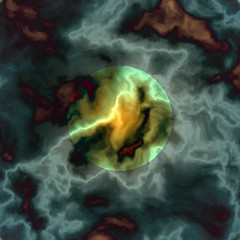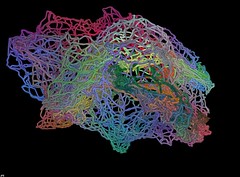 I make no claims of being clairvoyant (or more precisely, precognitive), but I can clearly foresee this: 20 years, and 50 years, and a century from now, journalists who don't know the first thing about psychical research will be writing what they think are knee-slappingly funny columns about psychics and their duped clients. The language will probably change somewhat, but in essence they'll read like this, from The Times:
I make no claims of being clairvoyant (or more precisely, precognitive), but I can clearly foresee this: 20 years, and 50 years, and a century from now, journalists who don't know the first thing about psychical research will be writing what they think are knee-slappingly funny columns about psychics and their duped clients. The language will probably change somewhat, but in essence they'll read like this, from The Times:What would you do if you were genuinely clairvoyant? If you could really tell the future? The possibilities are endless.You could make a fortune stock-picking and betting on sporting events. You could win the Nobel Peace Prize (by anticipating world crises and advising how they could be avoided), the various Nobel scientific prizes (by demonstrating in a series of controlled experiments that what we thought we knew about the natural world was wrong), and the Nobel Prize for Literature (by copying future masterpieces and passing them off as your own). You could save lives, avert catastrophes, only call restaurants when you knew that there was a table available. What fun you could have.
The writer, Daniel Finkelstein, doesn't just confuse clairvoyance (the ability to obtain visual impressions or knowledge through means other than the senses) with precognition (psychically catching glimpses of future events); he confuses precognition with fortune telling.
Psychics or "sensitives" are no more omniscient than you or I. They can't read tomorrow's newspaper today or tell you which horse will finish in the money. Most psychics would agree that they get impressions — sometimes clear, sometimes ambiguous — through using mental faculties that seem to operate best when sense impressions and thinking are stilled as much as possible.
Finkelstein goes on, wink-wink:
Here are some of the things you [if you were psychic] wouldn’t do: advertise on the internet, call yourself a celebrity psychic, appear on daytime TV, rent a table at a Psychic Fair just off Stanmore High Street, take a part-time job in Holland & Barrett while receiving clients at home of an evening, live in a caravan [trailer] park in Totnes, sell your wares in the classified section of the local paper and stand in front of a group in a half-full village hall saying that you’ve had a message from someone called John and asking if anyone knows anybody with that name.If his point is that there are self-proclaimed psychics who aren't all they profess to be, almost any psychical researcher would agree. In my experience, there are few completely fraudulent psychics, but there are a fair number who just aren't particularly talented … something you could as validly say about artists, automobile drivers, actors, and, hmmm, newspaper columnists. Many psychics have on and off days, like you probably do with whatever your skill happens to be.
 But his larger argument seems to be that no real psychic would ever indulge in commerce (presumably because they could get rich just by perfectly knowing in advance which investments will go up in value). We've already disposed of the idea that psychics know everything there is to know, which means they have to make a living, either through their psychic gifts or in some more mundane work. Why shouldn't a psychic take a part-time job at Holland & Barrett, whatever that may be, while receiving clients at home in the evening? I suppose Mr. Finkelstein has never moonlighted or written a freelance article.
But his larger argument seems to be that no real psychic would ever indulge in commerce (presumably because they could get rich just by perfectly knowing in advance which investments will go up in value). We've already disposed of the idea that psychics know everything there is to know, which means they have to make a living, either through their psychic gifts or in some more mundane work. Why shouldn't a psychic take a part-time job at Holland & Barrett, whatever that may be, while receiving clients at home in the evening? I suppose Mr. Finkelstein has never moonlighted or written a freelance article."Claims to be able to speak to the dead and tell fortunes seem so obviously ridiculous that they are easy to make fun of," he says. Yes, I guess those claims (which are not, by the way, what most telepaths and clairvoyants say they do) are obviously ridiculous, if you've never bothered to look into the vast literature on the subject.
I haven't time or space here to even begin to cite the evidence from more than a century and a quarter of serious scientific research on paranormal faculties. If you are interested, check out the Web sites linked under "Spirit/Psychical" in the blogroll to the right (and these are only a few sites, cherry picked from a much larger number; and Web sites are still far fewer than the reputable books and papers).
For a quick overview of scientific resarch that has tended to verify paranormal faculties, this page from Wikipedia might do. I agree that Wikipedia isn't always a trustworthy source, but this article — which is actually rather conservative — seems to have been written by someone with no particular ax to grind. For a more in-depth study, see Dean Radin's The Conscious Universe.
Since our columnist has had a right old laugh at the idea that psychic impressions might offer warnings ("You could save lives, avert catastrophes … "), I am sorry to have to tell him that there have been just such cases, even involving people who were not known as being psychic. Two examples — one actual, one potential — are given in the excellent The Dictionary of Mind and Spirit by Donald Watson. He writes:
Many theories about [precognition] involve ways in which information available to the unconscious mind is brought to conscious awareness. What would happen if this information were not successfully brought to conscious awareness? Would we still perhaps amend our actions in the light of unconsciously recognized danger, for example? Statistics suggest that this is actually the case. William Cox studied the figures for railway passengers in America over a twenty-year period, comparing the numbers of passengers on trains which had accidents with the comparable figures for those trains in the month leading up to the accident. The result was that fewer passengers always travelled on the train that crashed. Needless to say, more sceptical investigators have contested Cox's conclusions, maintaining that he had not discounted the effect of all the other variables, but proof of this kind is never likely to be one hundred per cent convincing. As with so many psi phenomena we will only ever find evidence of tendencies.A novel written in 1898 by Morgan Robertson, The Wreck of the Titan, showed remarkable similarities to the real life story of the Titanic, which (14 years later) like its fictional counterpart sank on its maiden voyage from Southampton to New York. "If one is unwilling to subscribe to the view that a discarnate [out-of-the-body] spirit was keen to write a novel based on a forthcoming event, one can hardly escape the possibility that in some altered state of consciousness the author himself had access to the future," Watson says.
 Finkelstein complains: "The activities of the pyschic industry have victims. Grieving people are being exploited and the naive enticed to part with cash. Falsely suggesting to the bereaved that you are in communication with a dead relative seems to me a terrible thing to do." It is a charge that has been made aggain and again since mediumship first became popular in the mid-19th century, and without doubt there have been instances where it was true. Nevertheless, the key word is falsely. However "grieving" or "naive" Finkelstein thinks clients of mediums are, they — not he, and not some government agency — have the right to determine for themselves as best they can whether what they learn from psychics, including mediums who believe they are a channel between this world and what lies beyond, is false or true.
Finkelstein complains: "The activities of the pyschic industry have victims. Grieving people are being exploited and the naive enticed to part with cash. Falsely suggesting to the bereaved that you are in communication with a dead relative seems to me a terrible thing to do." It is a charge that has been made aggain and again since mediumship first became popular in the mid-19th century, and without doubt there have been instances where it was true. Nevertheless, the key word is falsely. However "grieving" or "naive" Finkelstein thinks clients of mediums are, they — not he, and not some government agency — have the right to determine for themselves as best they can whether what they learn from psychics, including mediums who believe they are a channel between this world and what lies beyond, is false or true.People who are dissuaded by ignorant journalists from ever testing truth for themselves can also be victims.

3 comments:
This is totally off-topic, but I don't see an email address for you...
I was trying to access your November 2005 archives, but my browser kept crashing. Upon investigation I found that about 80% of the file consisted of zillions of nested FONT and SPAN tags. Yes, that would do it.
I don't how much control you have over the HTML code in these pages, but I thought I'd let you know about this.
Intellectual Pariah
This is only a proof that not all psychics are true.
In the
psychic industry, as in everything else, one must use discernment. A well thought out and timely piece of writing.
Post a Comment